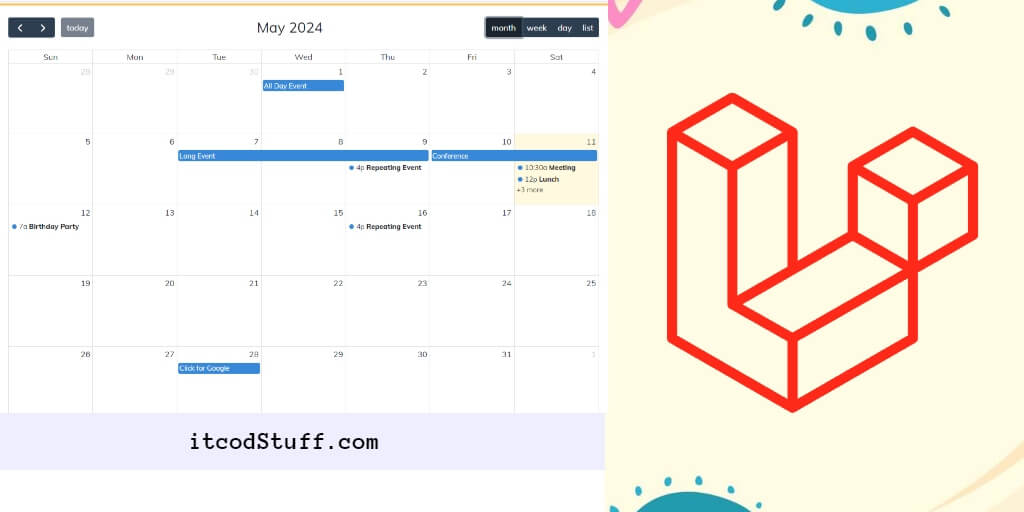FullCalendar is a JavaScript library that allow users to create, read, update and delete events in calendar from database using jQuery ajax.
Here, I will create an example to integrate a fullCalendar and create CRUD events in the calendar on laravel 11 applications using jQuery ajax from database:
Step 1: Create Event Controller
To create controller to manage events from db:
php artisan make:controller EventControllerDefine create, edit and delete event methods in app/Http/Controllers/EventController.php file:
<?php
namespace App\Http\Controllers;
use Illuminate\Http\Request;
use App\Models\Event;
use Illuminate\Http\JsonResponse;
class EventController extends Controller
{
/**
* Write code on Method
*
* @return response()
*/
public function index(Request $request)
{
if($request->ajax()) {
$data = Event::whereDate('start', '>=', $request->start)
->whereDate('end', '<=', $request->end)
->get(['id', 'title', 'start', 'end']);
return response()->json($data);
}
return view('fullcalender');
}
/**
* Write code on Method
*
* @return response()
*/
public function ajax(Request $request): JsonResponse
{
switch ($request->type) {
case 'add':
$event = Event::create([
'title' => $request->title,
'start' => $request->start,
'end' => $request->end,
]);
return response()->json($event);
break;
case 'update':
$event = Event::find($request->id)->update([
'title' => $request->title,
'start' => $request->start,
'end' => $request->end,
]);
return response()->json($event);
break;
case 'delete':
$event = Event::find($request->id)->delete();
return response()->json($event);
break;
default:
# code...
break;
}
}
}Step 2: Set Up Routes
Define CRUD event routes in routes/web.php file:
<?php
use Illuminate\Support\Facades\Route;
use App\Http\Controllers\FullCalenderController;
Route::controller(FullCalenderController::class)->group(function(){
Route::get('fullcalender', 'index');
Route::post('fullcalenderAjax', 'ajax');
});Step 3: Create Blade View
Create a file named fullcalendar.blade.php in the resources/views/ directory to render the FullCalendar and manage CRUD events in it:
<!DOCTYPE html>
<html>
<head>
<title>Laravel 11 Fullcalender Example Tutorial - ITCODSTUFF.COM</title>
<meta name="csrf-token" content="{{ csrf_token() }}">
<link href="https://cdn.jsdelivr.net/npm/[email protected]/dist/css/bootstrap.min.css" rel="stylesheet">
<script src="https://cdnjs.cloudflare.com/ajax/libs/toastr.js/latest/toastr.min.js"></script>
<link rel="stylesheet" href="https://cdnjs.cloudflare.com/ajax/libs/toastr.js/latest/toastr.min.css" />
</head>
<body>
<div class="container">
<div class="card mt-5">
<h3 class="card-header p-3">Laravel 11 FullCalender Example - itcodStuff.com</h3>
<div class="card-body">
<div id='calendar'></div>
</div>
</div>
</div>
</body>
</html>Step 4: Add FullCalendar CDN
Add fullcalendar cdn library in views file:
<script src="https://cdnjs.cloudflare.com/ajax/libs/jquery/3.1.1/jquery.min.js"></script>
<link rel="stylesheet" href="https://cdnjs.cloudflare.com/ajax/libs/fullcalendar/3.9.0/fullcalendar.css" />
<script src="https://cdnjs.cloudflare.com/ajax/libs/moment.js/2.24.0/moment.min.js"></script>
<script src="https://cdnjs.cloudflare.com/ajax/libs/fullcalendar/3.9.0/fullcalendar.js"></script>Step 5: Implement JavaScript Event
Implement javascript events with ajax to create, read, update and delete events from database:
<script type="text/javascript">
$(document).ready(function () {
/*------------------------------------------
--------------------------------------------
Get Site URL
--------------------------------------------
--------------------------------------------*/
var SITEURL = "{{ url('/') }}";
/*------------------------------------------
--------------------------------------------
CSRF Token Setup
--------------------------------------------
--------------------------------------------*/
$.ajaxSetup({
headers: {
'X-CSRF-TOKEN': $('meta[name="csrf-token"]').attr('content')
}
});
/*------------------------------------------
--------------------------------------------
FullCalender JS Code
--------------------------------------------
--------------------------------------------*/
var calendar = $('#calendar').fullCalendar({
editable: true,
events: SITEURL + "/fullcalender",
displayEventTime: false,
editable: true,
eventRender: function (event, element, view) {
if (event.allDay === 'true') {
event.allDay = true;
} else {
event.allDay = false;
}
},
selectable: true,
selectHelper: true,
select: function (start, end, allDay) {
var title = prompt('Event Title:');
if (title) {
var start = $.fullCalendar.formatDate(start, "Y-MM-DD");
var end = $.fullCalendar.formatDate(end, "Y-MM-DD");
$.ajax({
url: SITEURL + "/fullcalenderAjax",
data: {
title: title,
start: start,
end: end,
type: 'add'
},
type: "POST",
success: function (data) {
displayMessage("Event Created Successfully");
calendar.fullCalendar('renderEvent',
{
id: data.id,
title: title,
start: start,
end: end,
allDay: allDay
},true);
calendar.fullCalendar('unselect');
}
});
}
},
eventDrop: function (event, delta) {
var start = $.fullCalendar.formatDate(event.start, "Y-MM-DD");
var end = $.fullCalendar.formatDate(event.end, "Y-MM-DD");
$.ajax({
url: SITEURL + '/fullcalenderAjax',
data: {
title: event.title,
start: start,
end: end,
id: event.id,
type: 'update'
},
type: "POST",
success: function (response) {
displayMessage("Event Updated Successfully");
}
});
},
eventClick: function (event) {
var deleteMsg = confirm("Do you really want to delete?");
if (deleteMsg) {
$.ajax({
type: "POST",
url: SITEURL + '/fullcalenderAjax',
data: {
id: event.id,
type: 'delete'
},
success: function (response) {
calendar.fullCalendar('removeEvents', event.id);
displayMessage("Event Deleted Successfully");
}
});
}
}
});
});
/*------------------------------------------
--------------------------------------------
Toastr Success Code
--------------------------------------------
--------------------------------------------*/
function displayMessage(message) {
toastr.success(message, 'Event');
}
</script>Step 6: Test Laravel Application
Start Laravel application server using the artisan serve command:
php artisan serveHit http://localhost:8000/fullcalender url on browser for testing.
